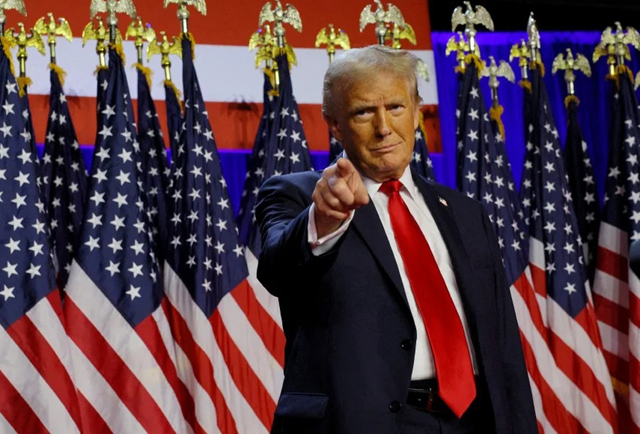
WASHINGTON, Nov 8, 2024 (BSS/AFP) - Donald Trump will have almost complete
control over the levers of government -- with only limited checks on his
power -- if Republicans add the House of Representatives to their White House
and Senate victories.
He can rely on five key factors as he pushes through his populist America-
First agenda:
- Democratic legitimacy -
Holding a more than five-million ballot lead on Thursday, Trump is set to
emerge with an overwhelming victory in the popular vote against Democratic
rival Kamala Harris.
He is on course to be the first Republican president in 20 years to achieve
the feat.
The 78-year-old has already secured a clear majority in the Electoral
College, which decides the president, with a margin that could still grow
once the results in Arizona and Nevada are finalized.
If declared the winner in these two states, Donald Trump will have completed
a clean sweep of the seven key battleground states.
Unlike with his victory in 2016, when Hillary Clinton won the popular vote,
Trump will be able to claim greater legitimacy for pushing through his
reformist agenda.
"America has given us a powerful and unprecedented mandate," he declared on
Wednesday.
Mid-term elections in two years will be the next opportunity for Democrats to
check Trump's power.
- An allied Congress? -
With counting still ongoing for about 30 out of the 435 seats, Republicans
are leading the race to keep their slim majority in the House of
Representatives.
Trump's camp has already regained control of the Senate, with a few seats
left to decide how large their upper chamber margin will be.
With a simple majority, Senate Republicans can confirm key executive figures
and federal judges nominated by the president, as well as pass some reforms -
- such as tax cuts.
Having successfully purged the Republican Party of members not aligned with
his "Make America Great Again" agenda, the president-elect is not expected to
face significant internal resistance from skeptical lawmakers.
Most legislation however requires a supermajority of 60 votes to progress in
the Senate -- a figure Republicans will not reach.
- A government of loyalists -
As a political novice when he took office in 2017, Trump's personnel choices
largely consisted of seasoned Republican officials and military leaders.
Given his unpredictable behavior, such moderating figures were dubbed by
critics in the party and media as the "adults in the room."
For his second term, the billionaire real estate mogul has made no secret of
his intention to surround himself with loyalists.
He is widely expected to reward those who helped him campaign, including
fellow billionaire Elon Musk and vaccine skeptic Robert F. Kennedy Jr., among
others.
Having also repeatedly clashed with the US Federal Reserve during his first
term, Trump will have the opportunity in 2026 to appoint the successor to the
current central bank chairman, Jerome Powell.
- A reshaped Supreme Court -
By appointing three deeply conservative Supreme Court justices during his
first term, Trump helped anchor the country's highest judicial power to the
right.
With its 6-3 conservative majority, the court has recently given Republicans
a slew of judicial victories -- most notably the overturning of the
nationwide right to abortion in 2022.
Two aging arch-conservatives, Clarence Thomas and Samuel Alito, aged 76 and
74 respectively, may consider retiring during Trump's next term, enabling him
to appoint two much younger replacements for life and cementing the court's
right-wing majority for decades.
- Immunity -
The Supreme Court ruled this summer that presidents enjoy absolute immunity
for "official" acts in office -- a landmark decision viewed as unleashing the
power of the presidency.
The ruling stemmed from the federal criminal case brought against Trump over
his attempts to overturn his 2020 loss to Joe Biden.
Now that Trump has once again become president-elect, that case and others
are expected to be thrown out.